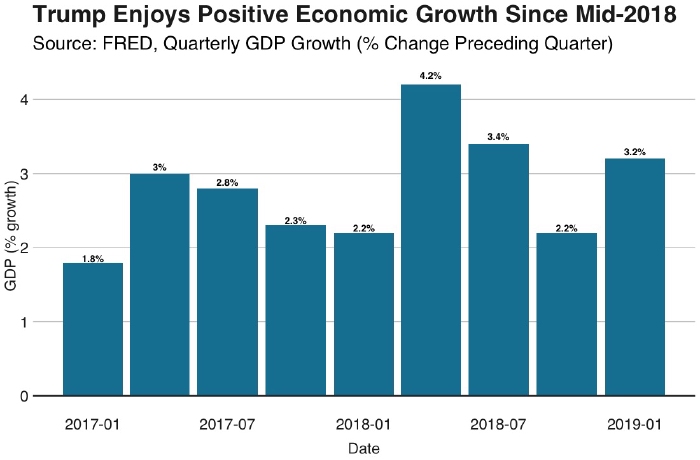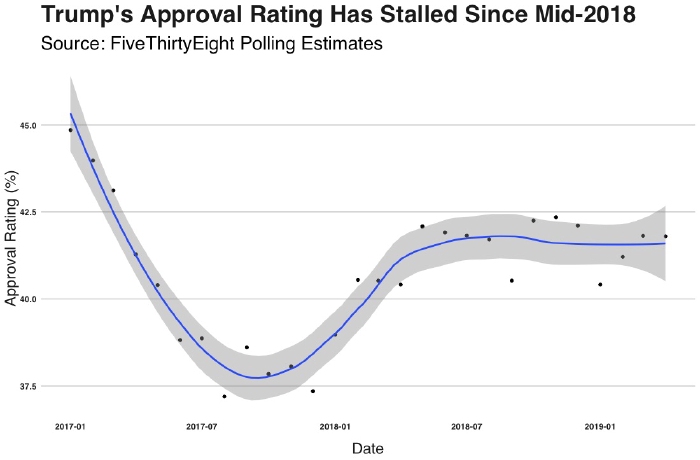The Mueller Predicament: Democrats in a Corner
Published 2019-04-24
Only President Trump would claim victory after the release of Mueller’s report which outlines in detail his campaign’s openness to cooperate with Russian agents and his desire to use his powers to shield him from accountability. He’s not wrong to declare success. Democrats wished for a killing blow to cap off months of low presidential approval ratings. Instead, the party is in an unenviable position in which they must choose between the principled and the practical course of action. Proceeding with impeachment appeases Democrats who believe they have a moral duty to hold the presidential accountable. Others assert the impeachment process would increase the chance of a successful Trump reelection. Either way, the decision will likely impact the 2020 election. It also appears Trump has reclaimed the upper hand.
Senator Warren and congresswoman Ocasio-Cortez are among the high-profile Democrats advocating for impeachment. They cite a constitutional duty to hold the president accountable for actions that amount to an obstruction of justice. There are grounds for this charge in Mueller’s report. While Mueller made it clear that he would leave it to Congress to make the case in court, in the second half of his report Mueller assembles a chronological account of how Trump’s actions thwarted the investigation into Russian interference in the 2016 election. Many Democrats assert that there are grave consequences for American democracy if they do not try to impeach Trump. Refusing impeachment may signal to rogue agents that they can interfere with American elections without repercussions. Many also think that this amounts to tacit submission to Trump’s misdeeds and allows him room to get away with greater abuses of power upon reelection. Other Democrats do not view the impeachment decision in moral terms.

Speaker Pelosi remains one of the most prominent Democrats to express reservations about impeachment. She cites practical political reasons for refusing to support impeachment. While an impeachment vote could go through the Democratic majority House, a vote for conviction is unlikely to make it through the Republican majority Senate. Senator Sanders, who shares Senator Warren’s leftist politics, sides with Pelosi on impeachment. Speaking immediately after Warren at a CNN town hall, he stated:
“If all Congress is talking about is impeaching Trump and Trump, Trump, Trump, and Mueller, Mueller, Mueller, and we’re not talking about healthcare, we’re not talking about raising the minimum wage to a living wage, we’re not talking about combating climate change, we’re not talking about sexism and racism and homophobia … what I worry about is that works to Trump’s advantage.”
There is some historical precedent for this. In 1998 an exonerated President Clinton enjoyed a 73% approval rating in Gallup polls conducted immediately after failed Republican-led impeachment proceedings. An acquitted Trump could benefit from the legitimacy of a formal exoneration. Republicans would be quick to deride Democrats’ decision to impeach, and deepen party divisions by casting Democrats as inept and obsessive.

While it is unclear what course of action Democrats will take, it is clear that the tables have turned in Trump’s favor. Before the report’s release, many thought Trump’s days were numbered. Now it seems as though it is the Democrats that have their backs against a wall. Trump stands to benefit from a Democratic party divide stemming from this impeachment decision. Though Trump gained the higher ground for now, the hullabaloo surrounding the Mueller report masks real weaknesses in Trump’s presidency. Despite the release of positive economic indicators, his approval ratings remain low. Democrats may be between a rock and a hard place, but Trump’s presidency and his reelection bid are still vulnerable.
